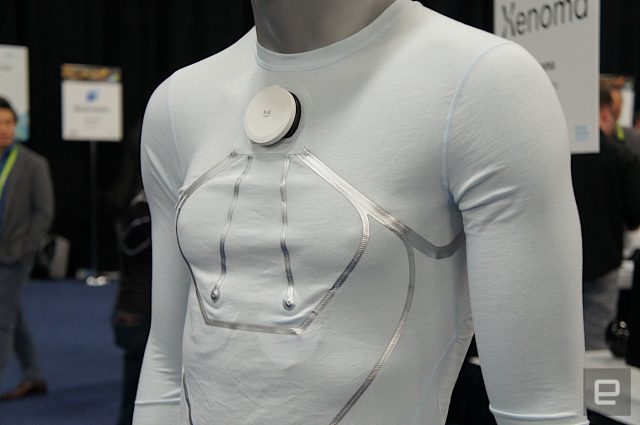Xenomo tarafından geliştirilen akıllı pijamalar, üzerinde bulunan sensörler sayesinde bunama (demans) hastalarının hareketlerini otomatik olarak kontrol edebiliyor. Bu teknolojiyle, demans hastalarının odalarında kapalı kalması ya da daima gözetim altında tutulması sorununun çözülebilmesi hedefleniyor.
Smart fabric company Xenoma is looking for ways to integrate its technology into our lives, and is looking to do so in the medical space. The Japanese outfit is showing off a set of smart pajamas that can be worn by patients in hospital, with a specific focus on dementia patients. It’s thought that, rather than confining people to rooms or keeping them under observation, the clothing can do the job automatically.
Embedded in both the shirt and pants are cloth sensors that are customized to pick up on specific inputs tailored to each item of clothing. The circuits running along the hips and legs are designed to detect motion, so professionals know when the wearer is moving. The technology in the shirt, meanwhile, is designed to monitor vital signs such as breathing, while an additional pair of ports on the sternum can be connected to an ECG, should it be required.
One of the most interesting innovations is the fabric sensors themselves, which don’t require gel or liquid contact to maintain conductivity with the skin. Even more importantly, the company claims that the cloth can be washed more than 100 times before showing signs of wear — making it as hardy as regular clothes.
At the top of the chest is an Iron Man-style plastic disc that holds the battery, Bluetooth LE unit and an accelerometer and gyroscope. The two-inch-diameter device should last for up to eight hours on a charge, although it’ll need to run for far longer than that in clinical scenarios. Speaking of which, Xenoma is conducting a limited clinical trial of the clothing with an as-yet unnamed German hospital in the near future.
It’s hoped that the hardware will be ready for medical use by 2020, at which point the cost per garment will be less than $100. Of course, that’s still a couple of years away, but it bodes well for a future where hospitals are far friendlier.





















